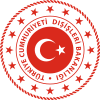Tevfik Rüştü Aras
This article needs additional citations for verification. (September 2010) |
Celal Bayar | |
|---|---|
| Preceded by | Şükrü Kaya |
| Succeeded by | Şükrü Saracoğlu |
| Personal details | |
| Born | Tevfik Rüştü 1883 Çanakkale, Ottoman Empire |
| Died | 5 January 1972 (aged 88–89) Istanbul, Turkey |
| Resting place | Aşiyan Asri Cemetery |
| Political party | Republican People's Party (CHP) |
| Alma mater | Beirut School of Medicine |
| Profession | Physician, politician |
Tevfik Rüştü Aras (1883 – 5 January 1972) was a
Early years
Aras was born in 1883 in Çanakkale. He graduated from the medical school of Beirut. He served as a doctor in İzmir, Istanbul, and Thessaloniki (Turkish: Selanik ). He became a member of the Committee of Union and Progress, and during his membership he met Mustafa Kemal Atatürk, the founder of the Republic of Turkey.
In 1918, he was a member of the high commission of health (Turkish: Yüksek Sağlık Kurulu). At that time he married the journalist Evliyazade Makbule, who was the daughter of a wealthy family from İzmir.
Political career


The
When the Law on the Maintenance of Order was effected on 4 March 1925, he was the
In 1933, he met with Bulgarian Prime Minister Mushanov in Plovdiv, because of the incident in Razgrad, where the Turkish cemetery was attacked. Aras claimed that the situation was stabilized and that the incident was an attempted provocation.[2]
Aras was elected as the president of League of Nations during the Special Session of the Assembly Convened for the Purpose of Considering the Request of the Kingdom of Egypt for Admission to the League of Nations in Geneva, on 26–27 May 1937.[1]
He was removed from his position as Foreign Minister right after Ataturk's passing away by the new Head of Republic Ismet Inonu. Aras and Inonu had different opinions in foreign affairs especially in Soviet relations, Inonu believed that Aras was more loyal to Ataturk rather than the government and conducting foreign affairs directly with him and finally Inonu had suspected Aras for lobbying against him before the Head of Republic election. He then was also involved in the establishment of the New Turkey Party in 1961.
Aras was appointed as ambassador to the
The speeches he gave during his ministerial period were collected in a book called "10 Years in Pursuit of Lausanne" (Turkish: Lozan'ın izlerinde 10 yıl) by Mr. Numan Menemencioglu in 1937. He also collected his stories (published in the daily press between 1945–63) into a book called My Views (Turkish: Görüşlerim).[5]
He died on 5 January 1972 in İstanbul,[6] and was laid to rest at the Aşiyan Asri Cemetery.
Role in the Armenian genocide
Tevfik Rüştü Aras was the brother-in-law of
In 1926, following the passage of the 'Settlement Law' designed to break up Kurdish majority areas in the eastern provinces, Aras justified the deportations to the British administrator of Iraq, Sir Henry Dobbs. Dobbs recorded how Aras said that the government was 'determined to clear the Kurds out of their valleys, the richest part of Turkey to-day, and to settle Turkish peasants there,' adding that the Kurds 'were to be treated as were the Armenians.' Aras apparently justified this argument: 'The Kurds would for many generations be incapable of self-government ... He always said long before the war that Turkey must get rid of the Albanians, Bulgarians and Arab, and must become more homogeneous.'[11]
Personal life
He had a daughter from his marriage to Evliyazade Makbule called Emel, who later married Fatin Rüştü Zorlu, the minister of foreign affairs from 1957 to 1960.[12]
References
- ^ a b "His Presidency session". Indiana University. Retrieved 2008-12-17.
- ^ Altuncuoğlu, Neslihan. "Ulusal Basın Ekseninde Atatürk Dönemi Öğrenci Hareketleri: Razgrad Hadisesi Örneği". Uluslararası Toplum Araştırmaları Dergisi. 17 (33): 712.
- ^ Aydemir, Şevket Süreyya (2017). İkinci Adam. Istanbul: Remzi Kitabevi. pp. 25–27.
- ^ ISBN 978-1-108-47504-4.
- ^ "kimkimdir". Kim Kimdir ( Turkish ). Archived from the original on 2016-10-02. Retrieved 2008-12-17.
- ^ "AHMET TEVFİK RÜŞTÜ BEY DR. (ARAŞ) (MENTEŞE)" (PDF). p. 763.
- ^ ISBN 9780805086652.
- ^ Baron, Jeremy Hugh. "Genocidal Doctors". Journal of the Royal Society of Medicine. November 1999, 92, pp. 590–93.
- ^ Archive of the Armenian Patriarchate of Jerusalem, Box 21, File M, Document no. 249
- ^ H.W. Glockner, Interned in Turkey 1914-1918 (Beirut, 1969), pg. 47
- ISBN 978-0-19-965522-9.
- ^ "Kronolojik Tarih 1933". İşte Atatürk (in Turkish). Retrieved 21 November 2022.
External links
 Media related to Tevfik Rüştü Aras at Wikimedia Commons
Media related to Tevfik Rüştü Aras at Wikimedia Commons

